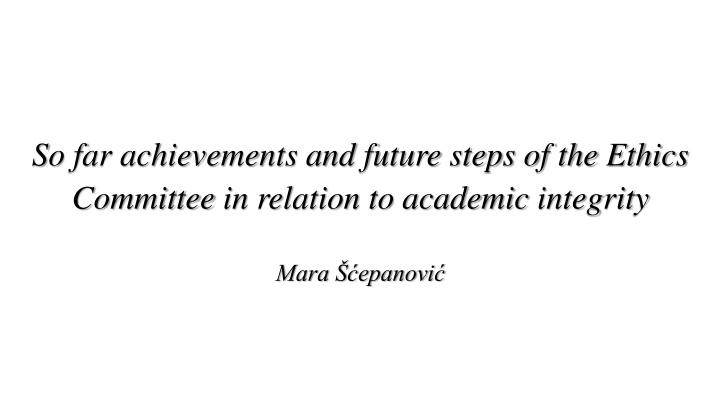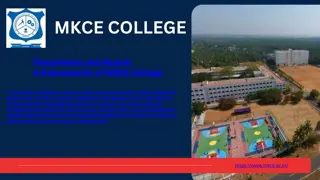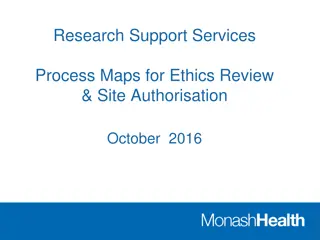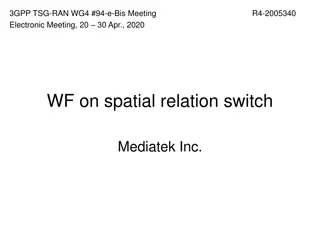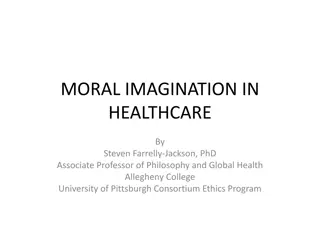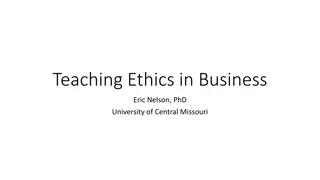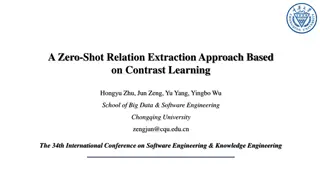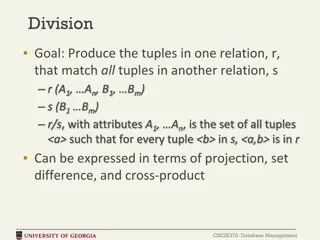So far achievements and future steps of the Ethics Committee in relation to academic integrity
Ethics Committee in relation to academic integrity has made significant achievements, adopting Ethics Charter, promoting principles of academic integrity, and deciding on violations. Future steps include enhancing transparency and addressing challenges in investigating violations.
Download Presentation

Please find below an Image/Link to download the presentation.
The content on the website is provided AS IS for your information and personal use only. It may not be sold, licensed, or shared on other websites without obtaining consent from the author.If you encounter any issues during the download, it is possible that the publisher has removed the file from their server.
You are allowed to download the files provided on this website for personal or commercial use, subject to the condition that they are used lawfully. All files are the property of their respective owners.
The content on the website is provided AS IS for your information and personal use only. It may not be sold, licensed, or shared on other websites without obtaining consent from the author.
E N D
Presentation Transcript
So far achievements and future steps of the Ethics Committee in relation to academic integrity Mara epanovi
Law on Academic Integrity, 27 March 2019 Responsibilities of the Ethics Committee Article 14 Ethics Committee:
1) adopts and monitors the implementation of the Ethics Charter; Thanks to the selfless help of the Program Office of the Council of Europe in Podgorica, the first convocation of the Ethics Committee (EC) prepared a draft and the second convocation of the EC completed and adopted the Ethics Charter. 2) promotes the principles of academic integrity; In the premises of the Ministry of Education, Science, Culture and Sports, on November 1, 2021, organized by the Ethics Committee, a round table was held on the topic "Strengthening academic integrity in institutions of higher education in Montenegro". Prof. Igor urovi , cochair of the Ethics Committee, prepared a Glossary of types of violations of academic integrity, the purpose of which is to list a wider list of types of violations of academic integrity from relevant domestic and international sources.
The aim of the Glossary is to acquaint the academic community with other, recognized in international academic circles, forms and ways of violating academic integrity, which, in terms of sophistication and difficulty of proof, can be much more problematic than those codified by the Law. In this sense, prof. urovi informed the attendees in detail about the guidelines for recognizing unethical behavior in science, even when violations of academic integrity are not specified in the Law or are difficult to investigate.
The glossary, together with the Ethics Charter and all relevant documents, can be found on the website of the Ethics Committee as well as on the websites of all universities and independent faculty units in Montenegro - With the financial support of the Council of Europe, a website was created: etickikomitet.edu.me, with the aim of transparency of work Ethics Committee.. 3) decides on a proposal to establish a violation of academic integrity for citizens of Montenegro whose work was published, that is, a qualification obtained outside of Montenegro; In the first convocation of the Ethics Committee, two decisions were made declaring the professor of the Faculty of Law responsible for the unauthorized taking over of parts of specialist works of her students and their publication at conferences and in magazines outside Montenegro.
Both decisions were annulled by the judgments of the Administrative Court (US) and returned for re-decision, partly due to the non-transparent process before the EC and partly due to imprecisely written decisions. The second convocation of the EC, prompted by the judgments, adopted new Rules of Procedure in which all previous ambiguities were additionally clarified (especially regarding the way of filing lawsuits as well as the conduct of the procedure itself). After "consultations" with the legal service of the then MPNKS in March 2022, the second convocation of the EC, due to lack of jurisdiction, had to reject both lawsuits, which were sent back for a retrial by annulling judgments of the Administrative Court.
In addition to the above-mentioned procedures, the EC received two more applications, according to which it was also declared incompetent, as in previous cases, on the same basis. 4) gives an opinion on regulations and initiatives concerning academic ethics; 5) submits an annual report on its work to the Government of Montenegro; 6) performs other tasks in accordance with this law.
Organization of visits to all universities and independent faculty units; Meetings with all ethical committees and teaching staff; Meetings with representatives of students;
Together with the agency for Control and Security of Higher Education Quality, we signed a Cooperation agreement in February last year. The purpose of concluding the agreement is to establish cooperation in areas of common interest and especially in the field of promotion and strengthening the application of the principles of academic integrity. The agreement also defines several joint activities that will be realized and the implementation of the Pilot Evaluation of the Additional Standard on the Recommendations and Improvement of Supplementary Integrity through the organization of workshops, strengthening cooperation, relying on the exchange of best experiences, etc. The round table on the subject of academic integrity is the first in a series of activities defined by this Cooperation Agreement.
Round table on the topic "Academic Integrity - State without which cannot" take place at the end of February last year. The round table gathered representatives of the Ministry of Education, the Ethics Commission, as well as numerous representatives of the academic community, referring to the results achieved in the previous period, such as the development and adoption of additional standards in academic integrity, which will be used during institutional assessment and developing through the project "quality education for all" with the support of the Council of Europe Office.
As a continuation of successful cooperation, the realization of pilot evaluation of additional standards in academic integrity, which will announce in testing the standards of its practical application in higher education institutions in higher education institutions. In this way, with the help of higher education institutions, an assessment of standards or recommendations will be given, whether the standard should improve and adapt to the needs of the Montenegrin higher education system. On the other hand, pilot evaluation will help institutions of higher education test their internal quality systems through assessing all criteria defined by additional standards on academic integrity.
In the period 5th to 8th of June, a visit to higher education institutions in Montenegro, as part of the pilot evaluation of the supplementary standard on academic integrity (standard 11. Mechanisms of academic integrity and strengthening the culture of integrity) was conducted. The evaluators, Carolyn Campbell OBE, MA LLB (University of Glasgow) and Stamenka Uvali -Trumbi (international expert in the field of higher education), hired by the office of the Council of Europe, interviewed the representatives of higher education institutions during 4 days in Montenegro about the challenges and ways of applying the principle of academic integrity at institutions and on that occasion gave proposals and suggestions for improving the application of the supplementary standard. The pilot evaluation of the supplementary standard is carried out by the Agency for Control and Quality Assurance of Higher Education, the Ethics Committee, and the office of the Council of Europe in Podgorica.
The pilot evaluation of the supplementary standard is carried out by the Agency for Control and Quality Assurance of Higher Education, the Ethics Committee, and the office of the Council of Europe in Podgorica. The round table on the topic Results of the pilot evaluation of the supplementary standard on academic integrity , within the project Quality education for all , which is part of the joint program Horizontal Facility for the Western Balkans and Turkey , co-financed by the European Union and the Council of Europe, was held on november, 2023. In the round table, external evaluators, representatives of the Agency and Ethics Committee presented the results of the assessment of the pilot assessment. After the presentation, representatives of all higher education in Montenegro participated in the reports of pilot assessment, but also emphasizing the challenges and ways to overcome these challenges with the principles of academic integrity in their institutions.
It was concluded that it is important to implement appropriate preventive and / or corrective measures in order to improve the teaching and research process of all services in higher education institutions. In addition, the measurability of the effects of implementation and implementationn of various activities conducted in order to strengthen academic integrity can be a good indicator of initiatives under higher education institutions, based on which possible and improve processes possible. Although until now (the second convocation of the EC started its work in March 2021) it has not been able to give opinions on regulations and initiatives related to academic ethics, which does not mean that nothing has been done. Furthermore, an attempt to implement the Academic Integrity Act in full force has found that the Act itself is virtually unusable.
The following EC activities: It proposes to the Initiative for amendments to the following laws: Law on recognition of foreign educational documents and equalization of qualifications.
Solution Article 20 The decision is made in the process of recognition of documents. The decision from paragraph 1 of this article is final in the administrative procedure. In the decision referred to in paragraph 1 of this article, the name of the foreign educational document, degree of professional education, title of professional education and professional title, etc. written, as a rule, in the language of the original educational system. the document is also in the Montenegrin language with the country of issue. (EC proposal: try to introduce the possibility of revocation in case of proven non-academic behavior)
Article 24 In the qualification equalization procedure, a decision is made. The decision from paragraph 1 of this article is final in the administrative procedure. By the decision from paragraph 1 of this article, the foreign qualification is equated with the corresponding qualification in Montenegro. (Remarks of EC: the same remark as in the previous comment)
2. Law on Higher Education (in Draft): Article 87 The institution concludes an employment contract for an indefinite period of time with a person who has been elected to the academic title of assistant professor, associate professor, and full professor, with the obligation to carry out elections to more or the same academic title for persons with the title of assistant professor or associate professor. The employment contract referred to in paragraph 1 of this article may be terminated if the assistant professor or associate professor does not meet the conditions for election to a higher title, or does not meet the conditions for re- election to the same title in accordance with this law. Academic staff with an academic title, after retirement or termination of employment, retain the acquired academic title. (Comment of the EC: formulate also the part about plagiarism, if proven)
During this year, the EC plans to organize a round table in cooperation with the Ministry of Education, Science and Innovation, the Agency for Quality Control and Assurance of Higher Education, as well as our well-known friends from the Program Office of the Council of Europe in Podgorica with representatives of the Ethics and Disciplinary Commission together with the representatives of students of all universities and independent faculties in order to get acquainted with the so far discovered cases of violation of academic integrity, both of teaching staff and students, the so-called case studies.
Insisting that learning about integrity enters all levels of the educational process, literally from kindergarten. In this sense, our proposal to the Institute of Education for the design of workshops on these topics is introduced as an obligation towards teachers and students!!!!
Thank you for your attention
